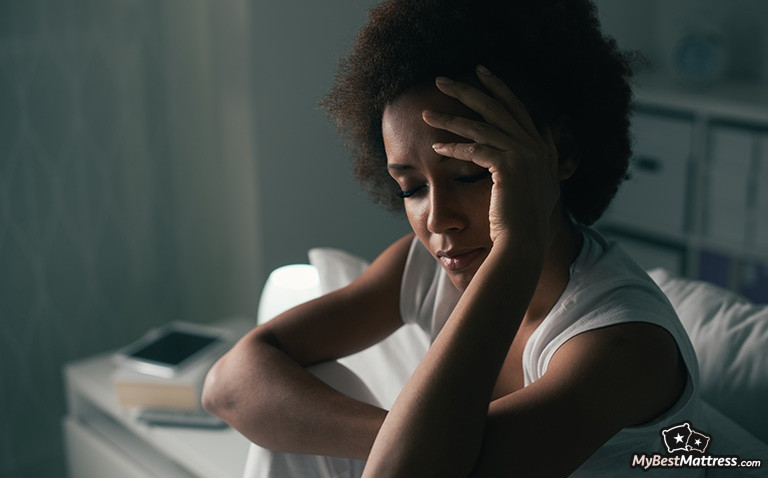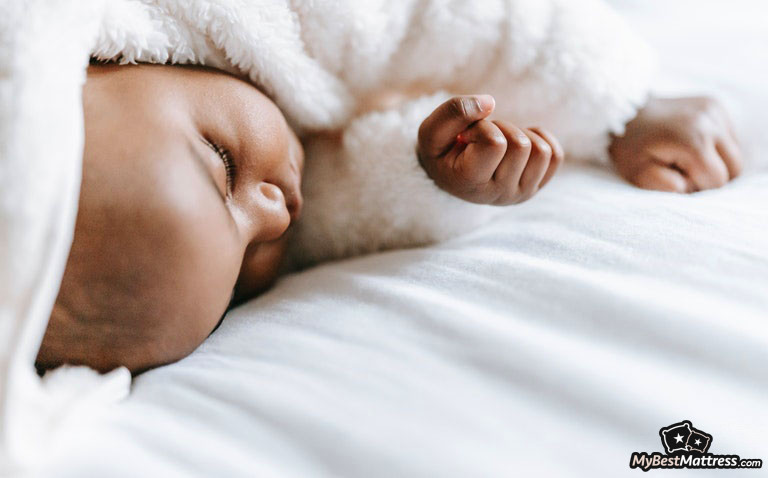
Whether you are a full-grown person or a child - you tend to experience the wildest of dreams. And we all know that babies spend most of their time being cute and taking long naps. But do babies dream like the rest of us?
Understanding how dreams actually work is quite a challenge. Dreaming has always been a sort of out-of-body or soulful experience for most people. Some might take dreams as signs or future predictions, but there is actually a lot more science behind it.
More than that, nobody is able to remember anything from the times of being a baby. I know I don’t. The farthest that I can remember is when I was 4. I don't even remember how my old bed looked when I was little! And most of these memories seem faint, and made out of still images - basically like looking through a photo reel.
That is because our memories get replaced by new ones, and there is no way to tell if we actually had dreams during the first years of our lives. So that leaves us with one question - do babies dream?
Table of Contents
- 1. Do Babies Dream? A Question That Still Baffles Researchers
- 2. Nightmares in Babies?
- 3. When Do Babies Start Dreaming?
- 4. Sleep Appliances for Parents with Babies
- 4.1. Mattresses
- 4.2. Mattress Protectors
- 4.3. Crib Mattresses for Babies
- 5. What Do Babies Dream About?
- 6. The Five Human Senses in Newborns
- 7. What Can Parents do for Their Babies?
- 8. Conclusions
Do Babies Dream? A Question That Still Baffles Researchers
There’s a lot of science behind dreaming that we still haven’t figured out yet. You see, our brains take some time to develop when we are born. And the question "when do babies start dreaming" is a complete mystery to us since we are obviously unable to talk and think coherently for a while.
Therefore, we can’t really determine if things such as dreaming are present in our tiny minds without lengthy experiments and research. So do newborns dream and sleep the same as us?
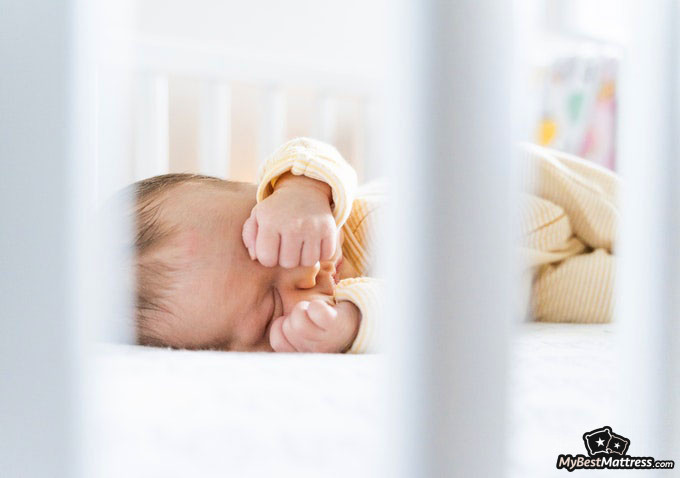
On average, babies sleep between 16 and 18 hours so we can only assume that they must be dreaming at some point! Right? I mean, we as adults take half the time to sleep and we still find the time to dream about things like sailing on a boat, or tomorrow’s dinner.
So before we get into figuring out the question “do babies dream”, we have to know how babies sleep and what are the stages of sleep that newborns go through.
Research by the American Academy of Pediatrics showed that newborns spend 50% of their sleep in REM [1], whereas adults - only 20%. In other words, when babies sleep, they spend half of their time taking in the information that they’ve gathered.
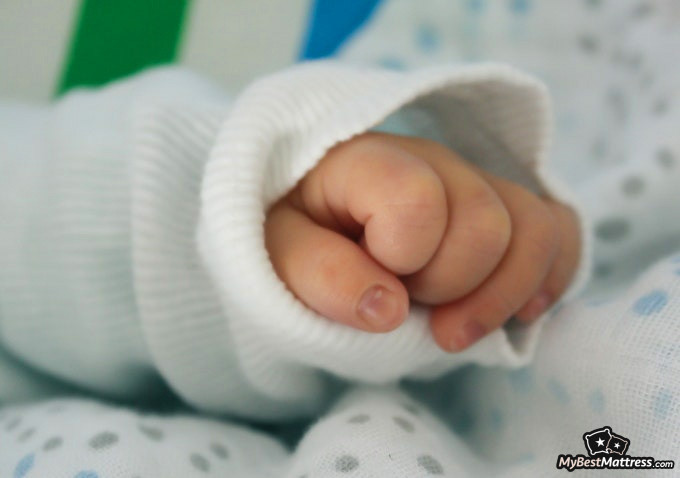
That is because newborns still have underdeveloped brains and need more time to digest information.
Now then, let’s take a look at what types of sleep stages babies go through.
- At the first stage, they get a little tired and start falling asleep. This is when the baby’s eyes start to slowly drop, then it tends to do a little stretch and starts sleeping.
- When they reach the second stage - newborns start their REM sleep during which they start moving around a bit. (In short, REM is when your brain goes into the deepest form of sleep and is the most active. What this stage of deep sleep means is that it is crucial for the development of a newborn baby).
- When they reach the third stage, newborns often go into a lighter form of sleep which essentially means that they’ve finished their "learning stage" and are finally resting.
- During the final two stages, babies fall into this deep sleep called non-REM in which they completely relax.
Now that we know how babies actually fall asleep, let’s figure out the million-dollar question - do babies dream.
As I’ve mentioned earlier, some researchers believe that babies do not dream because they aren’t able to experience much yet.
But this is still uncertain.
Dr. Allan Greene suggested in his article that the younger the infant, the more it actually dreams, and fetuses tend to dream at least a couple of months before they are born![8]
As a matter of fact, let’s take a look at the earliest stages of a baby's life. Can the baby dream while still in the womb? Is there any possibility that fetuses can dream about their life in the belly of a mother?
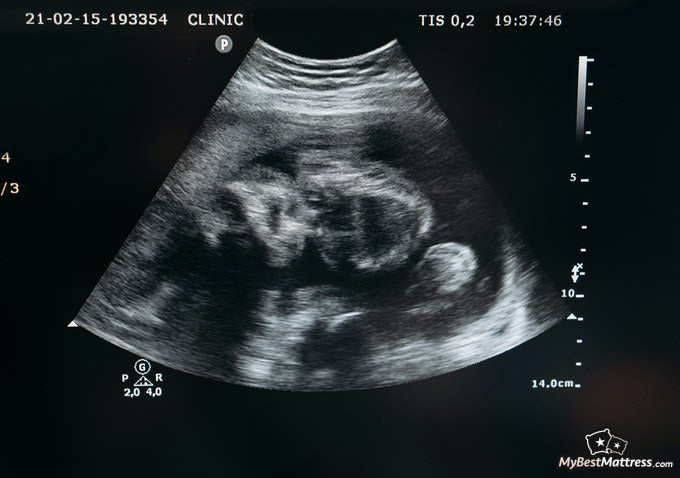
I mean, figuring out the question “what do babies dream about” would be ground-breaking, but an unborn baby, still in its mothers' womb? That seems like a long shot, right?
According to a study done by the Department of Obstetrics and Gynecology in Thailand, fetuses between the age of 30 to 40 weeks had regular sleep and wake cycles.[4]
This could indicate that babies still in the womb might be able to have dreams, just not the same dreams as kids or adults. These dreams would be very strange, mostly a compilation of strange images of the surroundings.
One study showed that when a mother is over 7 months pregnant, the fetus has an increased development rate, and is asleep for pretty much until it is born.[9]
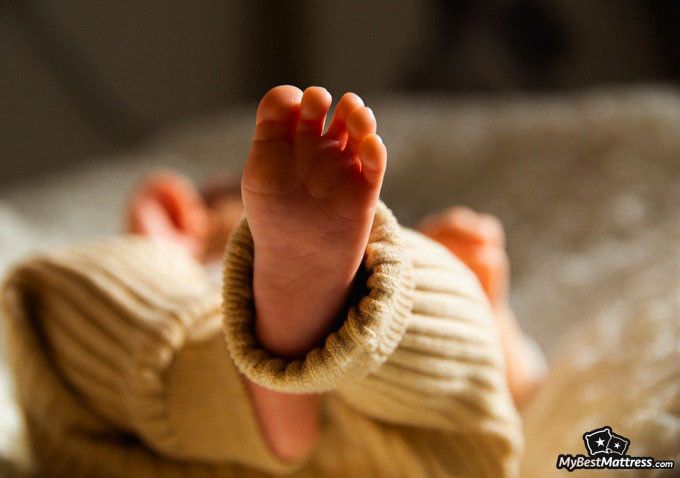
Also, an expert in the sleep phenomena David Foulkes has been researching the neurodevelopment of newborns for quite a while now. In his book, he suggested that if a fetus has not yet seen reality - it cannot actually imagine it. And because of that, he says that they are unable to dream.[6]
Another research paper by the American Institute of Physics mentioned that learning about the brain activity of a fetus is impossible.[3] That is because we can determine sleep habits only by looking at eye movement. And until the fetus reaches 7 months - it has no rapid eye movement.
All in all, the question "do newborns dream" seems to be quite a topic of discussion amongst researchers. And we can't really tell who is right or wrong. But what about nightmares though?
Nightmares in Babies?
We all tend to have nightmares every now and then. Sometimes it’s completely unrealistic that you wouldn’t even call it a nightmare - just something you didn’t really understand.
But some nightmares could put you up in an uneasy way with sweat coming down your forehead!
In fact, you can check out our article on stopping nightmares. But either way, could that be a possibility for babies? Do babies dream bad dreams?
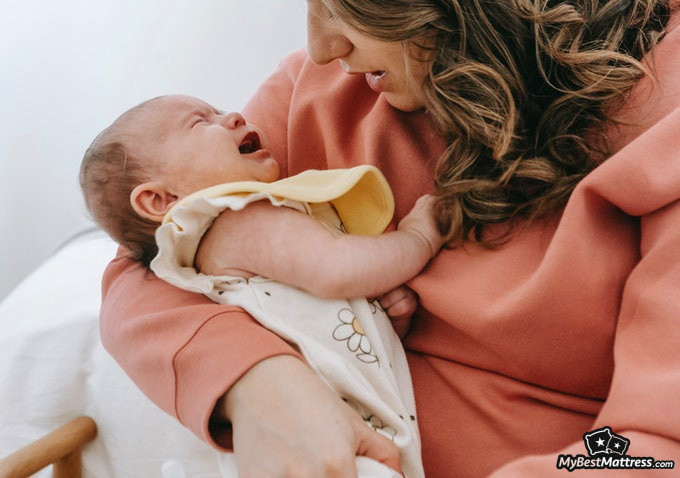
According to a Cleveland Clinic article, only children between ages 3 and 6 experience nightmares, and they tend to decrease over the years.[2] That is probably because babies are still not able to understand fear and danger in their lives.
Therefore, newborns having nightmares shouldn’t be something to worry about - they’re just being babies.
When Do Babies Start Dreaming?
Considering that babies spend 50% of their sleep in REM, we can be certain that something is definitely going on in their little heads during that time. Why is that? Because REM sleep is the time when our brain gathers all the information that we’ve compiled during the day.
And it’s the time that we dream.
Therefore, it would be only logical that babies, who spent more than twice as much in REM, take some quality time in their own dream world. Even we, as adults or kids at a certain age, are able to dream with even less time in REM sleep.
So, what do researchers say about the question "when do babies start dreaming"?
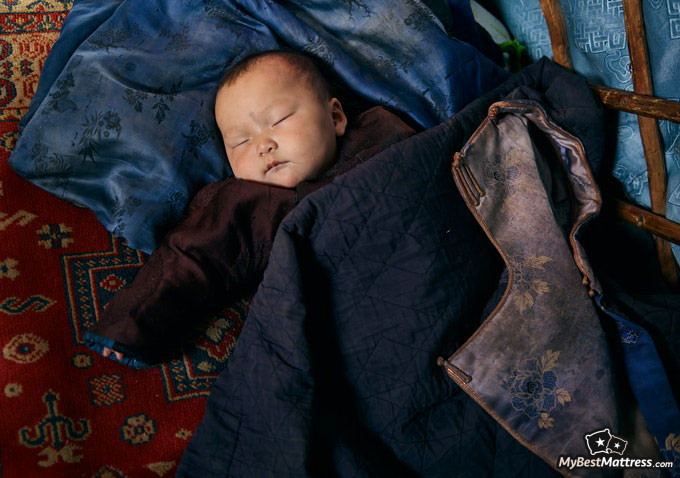
Psychologist David Foulkes in his book suggests that up until the age of 7 to 9 years old, babies may be able to dream still images and figures.[6]Only when they get to almost preschool age, they can process lengthy, video-like dreams.
This might suggest that when the baby's brain is not yet developed, it can't dream as we do, but random, static figures can occur in their dreams. So the answer to the question "when do babies start dreaming" is still uncertain, because hallucinating and imagining things are not out of the realm of possibility at their age.
Sleep Appliances for Parents with Babies
Did you know that on average new parents get from 5 to 6 hours of sleep? I’m sure you can relate. So If you’ve just become a parent, well then congratulations! But really, if you’re just starting out your parenthood - it must be quite rare to have a good night’s sleep, right?
So, for now, don't worry about what do babies dream about, or when do babies start dreaming, and take a look at what you can do to better your sleep.
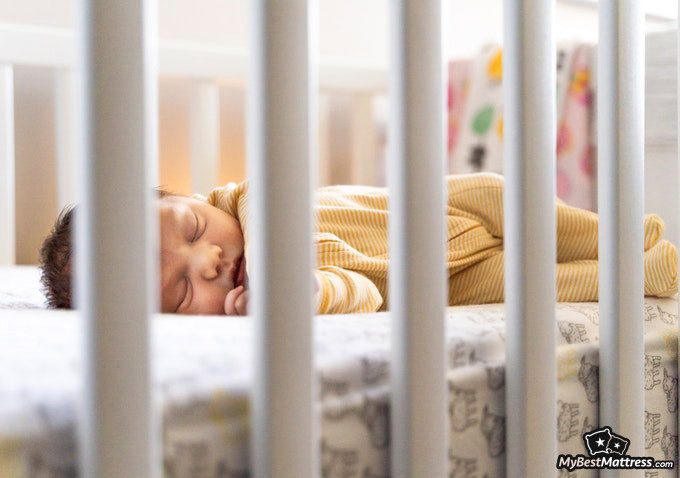
I mean, if you get at least a couple of hours of sleep - you would love for it to be as good as possible! So what can you do to improve that?
There are tons of appliances that can be used to improve sleep. It could be drinks, medication, but not everyone wants to take something just to sleep better. Well, have you thought about a new bed? Maybe some new sheets for your bed? Let’s take a look at some bed products that may improve your sleep.
Mattresses
You could try to hire a nanny or someone to take care of the baby for you, but having another person putting your baby to sleep at night doesn’t sound quite right. So, instead of doing that, how does a new mattress sound?
Getting a new, comfy mattress will make you enjoy every hour of your sleep. Not only that, a lot of mothers get back pain from lifting their baby out of the crib. Therefore, some mattresses have features that alleviate such aches and ensure your quality of sleep.
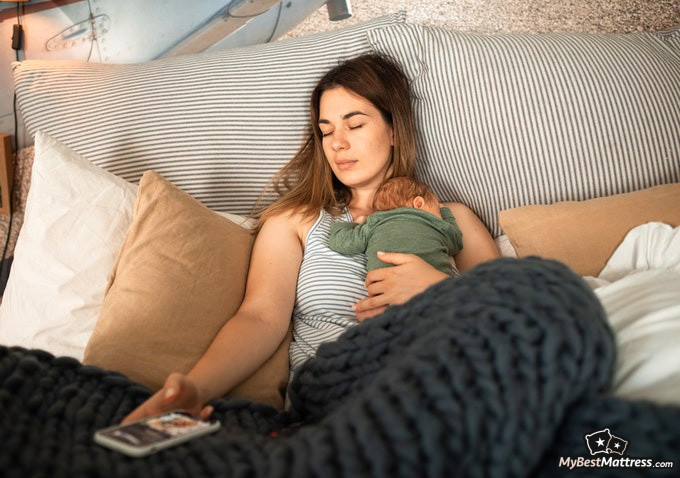
In fact, Saatva has been asleep product guru for years. This company makes high-quality mattresses with cutting-edge features such as pain relief, temperature control, and weight distribution.
Like I’ve mentioned before, you might experience some back pain from carrying your baby. Therefore, if you are looking for something that will alleviate back pain, you can check out the best mattresses for back pain and see which one suits you the best.
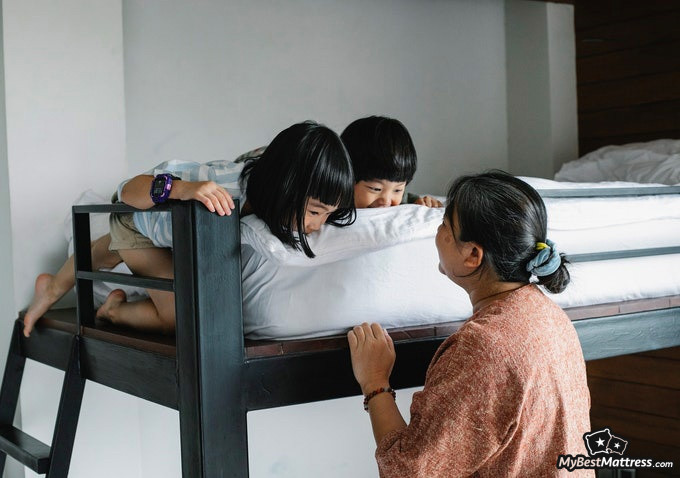
If you’re not experiencing any pain, but want to improve your sleep quality - a perfect solution would be the Saatva classic which is just an all-around great solution and upgrade to your old mattress.
Latest Saatva Coupon Found:
UP TO $500 OFF
Limited-time Saatva Sale
We're sharing a limited-time Saatva mattress discount with our readers! Grab this deal & enjoy your new mattress with huge discounts.
Mattress Protectors
I’m sure some parents like having their babies around when they are in bed. It’s probably a good way to spend time together, especially if you’re working from home or taking a maternity/paternity leave. But you know how these small troublemakers can be, right? And it’s not their fault that the bathroom is miles away!

Therefore, if you do decide to get a comfortable mattress - be sure to grab a mattress protector as well. Why? Well, I don’t think we should get into details, but essentially it won’t let your new mattress get stained.
In fact, some of these mattress protectors, like the Puffy mattress protector, are actually waterproof so cleaning them won’t be an issue. If you’d like to know more about these bed appliances, check out our reviews on the best mattress protectors.

Did you know?
Have you ever wondered which mattresses are approved as the best for sleep?
See & compare TOP mattresses side by sideCrib Mattresses for Babies
Just like adults, newborn babies need quality sleep on a comfortable surface. And some parents might not even think about it. The crib mattress could be damaged or just plain uncomfortable. That could lead to serious health problems in the future.
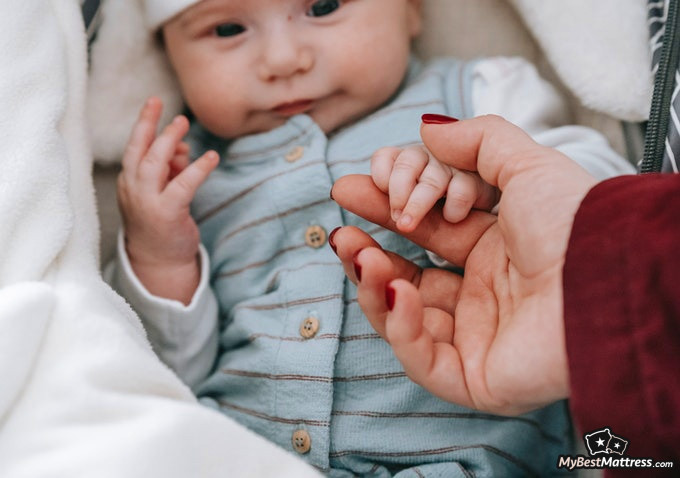
I mean, having a sore neck or back for a baby could impact the posture. Especially nowadays when a lot of school work is done behind a computer screen. And as we all know - it involves sitting for long periods of time. Therefore, it is crucial to start tackling the problem before the baby grows up.
So what if your baby is keeping you up at night because he isn't comfortable? There might be a solution for that.
Crib mattresses are specifically designed for babies to get better sleep. In fact, some of these mattresses can be flipped around and slept on both sides. Why is that? We usually think that babies like to lie on a soft surface. But that is not always the case.
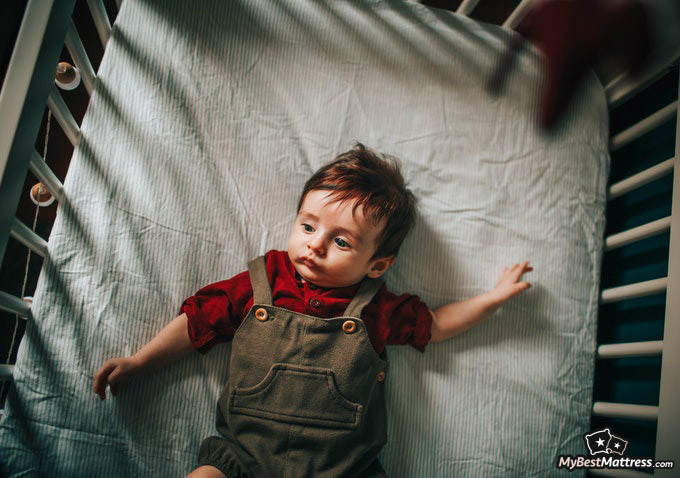
Same as adults, newborns have their own preferences! Some might enjoy sleeping on a soft crib mattress, but others may like their mattress firm. But what if you don't know what type of firmness your baby will like? That's where these flippable crib mattresses come in handy like the Little Dreamer from Moonlight Slumber.
It has two firmness options - one side is soft, and the other is a lot more firm.
At this point, all you have to do is monitor your baby and see which side is better. As a side note, you shouldn't expect the mattress to be a complete show stopper for the baby. Newborns might still wake up and cry even if they are lying comfortably.
However, a comfortable mattress will definitely lower the risk of sleep disturbance, and soreness in the back or neck.
What Do Babies Dream About?
Humans tend to dream experiences of their daily life, sometimes even imaginary things that make no sense at all! In order to do that, they have to be able to think independently and perceive information.
Let’s say, for the sake of the argument, that babies are actually able to dream. And they spend literally half of their baby life sleeping! What would they dream about? I mean, they were born like 5 minutes ago.
So is the question "do newborns dream about stuff" out of the realm of possibility?
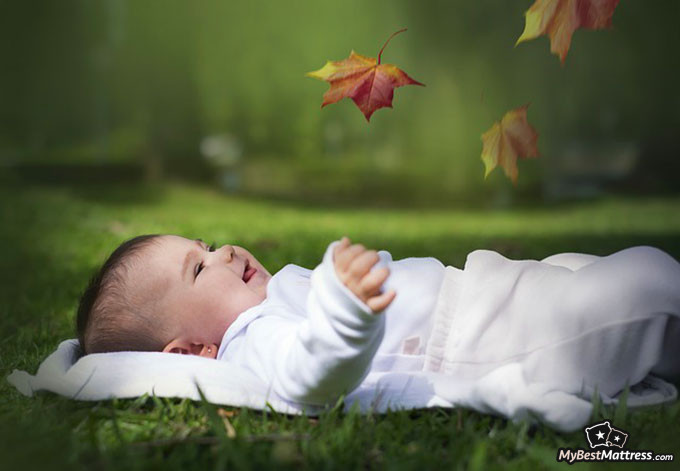
It's very unclear what do babies dream about. I mean, they haven't really experienced much yet! But who knows, babies could have some out-of-body experiences when they sleep. Maybe that's why they sleep so much.
“So should I just take my baby for a rollercoaster ride?”
Of course not! Before newborns actually start dreaming, they have to experience and feel the world around them without any intervention! Their brain won’t be able to comprehend extreme or complicated situations, so they would only feel scared.
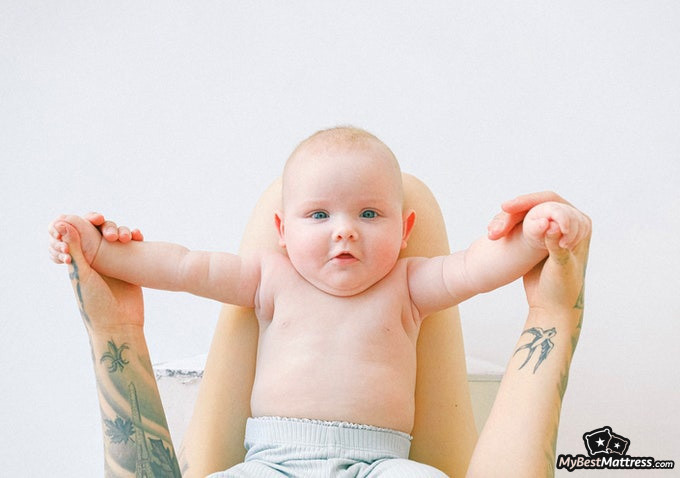
“Well, what do babies dream about without experiencing anything?”
In an interview with the New York Times, the Director of the Center of Sleep Medicine Dr. Charles P. Pollak talked about the dreams of infants. He compared babies to house pets on the premise that both of them can’t really tell you if they were dreaming.
It can only be speculated what kind of dreams babies might have. If they have any at all. But if they were to have dreams, they would most likely be very faint: a bunch of still images with no context or movement whatsoever.
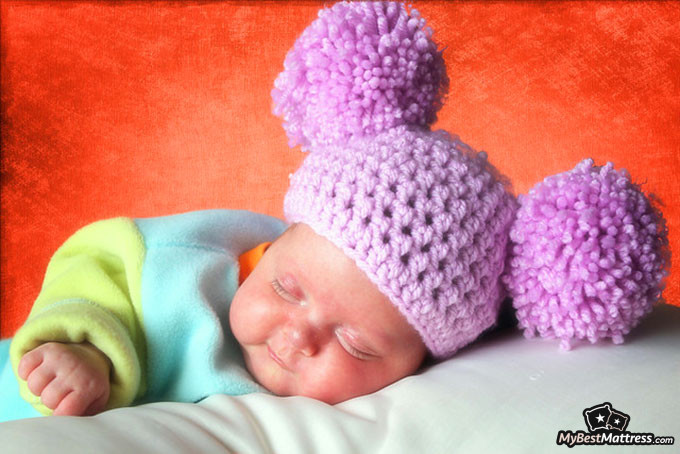
So, knowing a bit more about what do newborns dream about, what could be the causes of them dreaming? Well, the answer might lie in the fact of how they perceive the world.
The Five Human Senses in Newborns
Seeing as the question “do babies dream” is still uncertain, there must be something that they need before they start visiting dreamland. So, what about senses? How do newborns' dreams get affected by touch, smell, taste, or even sound?
You might ask why this would be important. Well, usually, in order to comprehend something, or better yet, see it in our sleep - we have to experience or view it in real life at some point. Therefore, we need to figure out if babies have the required senses to actually have a dreaming experience.
Let’s look at how good the basic human senses are in a baby.
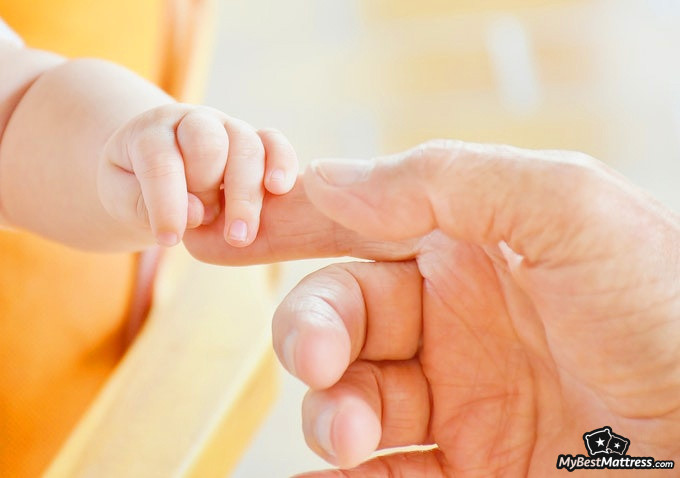
Well, the good news is - babies are born with all 5 human senses! So they must be able to perceive everything around them, right? Well, not entirely. They might have all the right skills, but just like any other skill - babies have to train them one way or another.
However, some senses of babies are very... sensitive.
So, you probably know that newborn babies have very sensitive ears. In fact, it is probably the best hearing they will ever have! You might experience your baby fidget around or scream whenever there are loud noises. And they will respond to any unfamiliar sounds very abruptly.
However, when babies are presented with quiet music or a soothing lullaby - they tend to relax and have a quick shut-eye. Even more so, if there is a funny or a cheerful sound - they burst out laughing or smiling. This means that babies are able to perceive emotions through sound which is crucial for their development process.
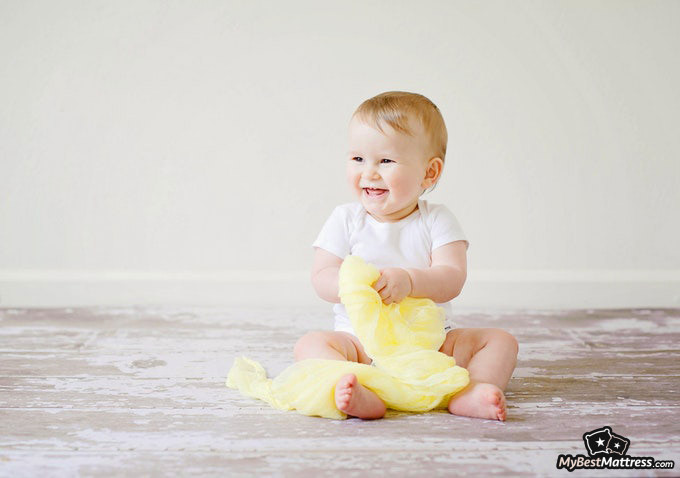
Have you ever seen that video on Youtube where the baby bites on a lemon for the first time? Well, the reaction was priceless, and he got to experience a taste that isn’t particularly sweet or neutral. That is because babies tend not to bond well with bitter or sour tastes which are quite acidic.
Not to mention, newborn babies are usually on a breast milk and baby food diet for some time.
You’ve probably noticed that babies tend to look around like small birds that just hatched out of their eggs. That is because newborns are only able to concentrate on something that is right in front of them.
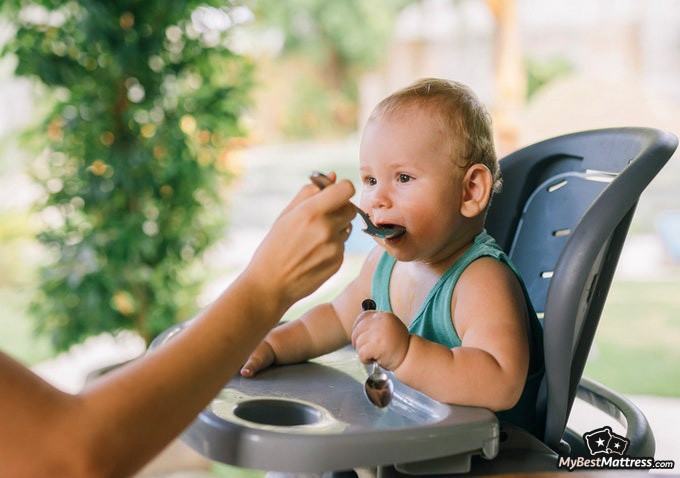
In fact, they can only see darkness, light, and some colors! For this reason, we could ask - do babies dream if they can't fully see? Because only after a couple of years, babies are able to fully see and use their eyesight (like follow things around with their eyes or see all the colors) at full potential.
Either way, don’t mind the baby just looking around - the newborn is just checking if there is room for you in the house!
Babies obviously like to be snuggled and held closely to feel secure. They also tend to grab onto somebody’s finger or give a plush toy a massive hug. That is why the sense of touch is probably the most important for a newborn baby - it is a feeling of security, love, and a passion for experience.
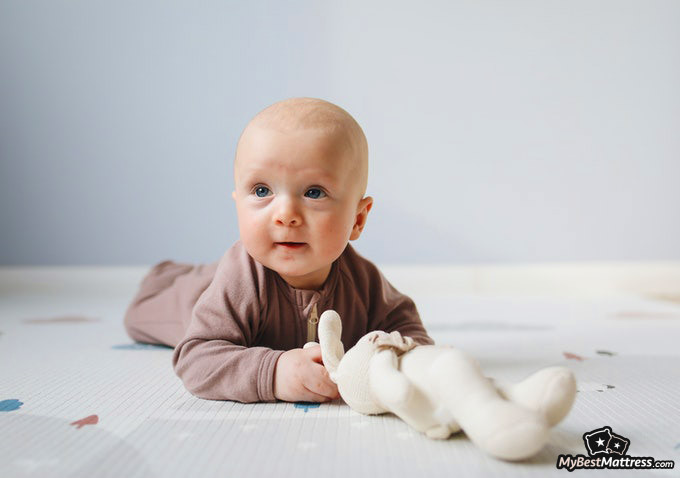
And this could be an important factor for the “what do babies dream about” question because the sense of touch is a part of experiencing things, which may lead to dreaming.
Finally, just like hearing, babies have a high sensitivity to various types of smells. Especially their mom and her breast milk!
By knowing that all of these senses are present in a newborn, we can at least be partially certain that they may have something going on during their sleep phase.
What Can Parents do for Their Babies?
Assuming that your child might be restless at night and act like a substitute for an alarm clock, then it could be having some sort of bad dream, right? Or maybe, at 4 AM, the baby realized it hasn’t gotten an hourly hug!
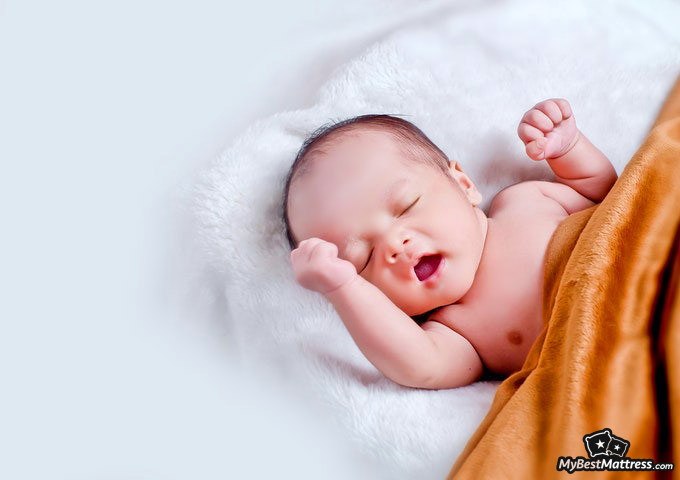
It is hard to say what babies want, but there are some things that parents can do. Especially if you want to ensure that the whole family gets a good nights’ sleep! If the baby is having a tough time staying in bed, then you’ll probably want to comfort him in some way!
Here are some things that you might want to look out for when your baby is in full alert mode:
- You have to make sure that the baby gets long hours of sleep. Especially during the day.
- The going-to-bed routine must be consistent and should not change the slightest bit. This way your baby will feel when the time to sleep has come.
- Make sure that the baby is comforted (preferably by one of the parents or siblings) so it can set sail into the dreamworld before you do!
- Find out creative ways to put your baby to sleep like reading a story or doing some activities that will put the baby to sleep. Maybe singing a lullaby will do the trick!
In any case, I’m sure you will find something that puts your baby to sleep. Likewise, new parents often forget that their baby will wear them down, especially during the night.
And being fully rested is a must for a new parent. Especially if you're having more than one baby - that could turn you into a full-time nanny.
Conclusions
We’ve looked at all the research that has been presented over the years about babies having dreams. And it’s still quite puzzling because we can’t really ask them what they saw in their dreams, because, you know, they’re babies. And they hang around in their crib most times. Therefore, the same question still remains - do babies dream?
Well, if I had to guess and consider the research, I would say that they might be dreaming. That is because babies spend lots of time in REM sleep and share the same sleep stages with adults. However, the problem is that newborns are still developing their brains, and they might not experience reality the same as we do.
All in all, there must be something going on in their brains since babies sleep way more than they are awake. And most of that sleep is for their own brain development. But it is very hard to monitor their brain activity at a young age. So we can only wait for further research to tell us exactly what goes on in the mind of a baby.
Scientific References
1. American Academy of Pediatrics: 'Stages of Newborn Sleep'
2. Cleveland Clinic: 'Nightmares in Children'
3. American Institute of Physics: 'Baby's First Dreams: Sleep Cycles Of The Fetus'
4. Suwanrath C, Suntharasaj T: 'Sleep-wake cycles in normal fetuses'
5. University of Rochester Medical Center: 'Newborn Senses'
6. Foulkes D: 'Children's Dreaming and the Development of Consciousness'
7. American Academy of Pediatrics: 'Stages of Newborn Sleep'
8. Greene A: 'The Truth about Children’s Dreams, Nightmares, and Night Terrors'
9. Poblano A, Haro R, Arteaga C: 'Neurophysiologic Measurement of Continuity in the Sleep of Fetuses during the Last Week of Pregnancy and in Newborns'
Leave your honest feedback
Leave your genuine opinion & help thousands of people to choose the best mattress. All feedback, either positive or negative, are accepted as long as they’re honest. We do not publish biased feedback or spam. So if you want to share your experience, opinion or give advice - the scene is yours!



